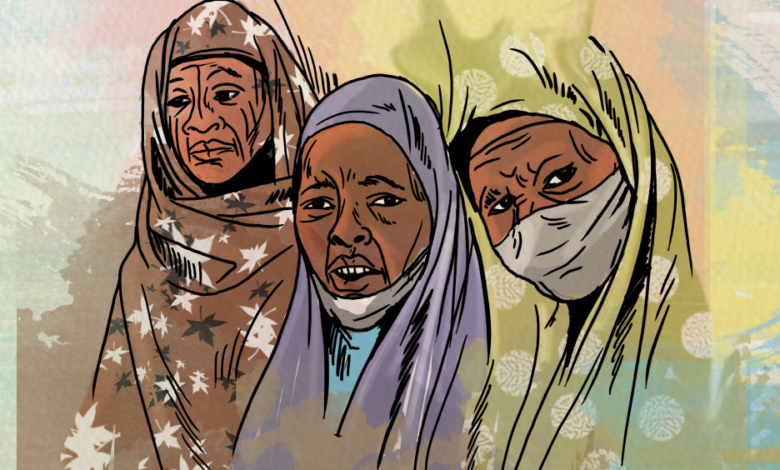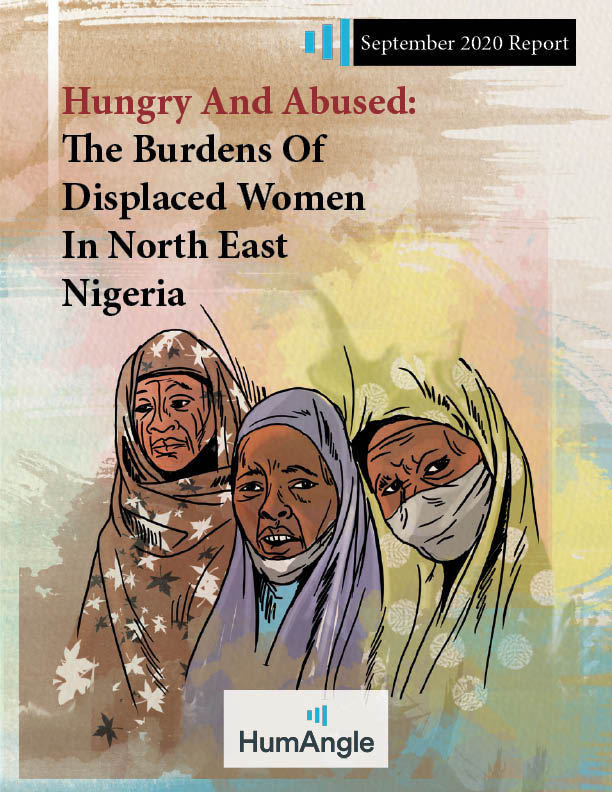Navigating Hunger And COVID-19: Pathetic Story of IDP Sole-Providers Battling Against Starvation

Fanna Modu has 11 dependants and 10 among them are children. On good days, she hands out N10 notes to each so they can get food to eat.
These good days are bad days in normal survival terms but nothing about the conditions of Internally Displaced Persons in Northeast Nigeria is normal.
Modu, like many other women in camp, is a sole provider for her household which has been thrown into heavy dysfunction by bouts of conflicts and terror attacks.
The husbands are absent, not by choice. They are scattered in detention camps after being separated from their families on the suspicion that they are members of the Boko Haram insurgency group.
The separation of family members occurred after they escaped from territories held by Boko Haram insurgents.
The women were told that the government would protect their husbands from retaliatory Boko Haram attacks but no fresh information about them is known thereafter.
The women have children and relatives to fend for with almost nothing.
Fatima Bunkar with six children and her father to cater to is among them.
The women painfully narrated their ordeals and daily struggles to feed their families with little support from donor agencies to HumAngle.
Women assuming new roles
Borno State like most northern Nigerian states, is inherently patriarchal and for ages, women have depended on their husbands and male family members for support and care.
With their husbands in detention, the women have been forced to parent alone and provide for their families albeit in really dire circumstances.
For over 10 years, Nigeria has battled terrorism perpetrated by Boko Haram and its splinter groups which has left several dead and displaced millions, including Modu and Bunkar.
According to the United Nations Office for the Coordination of Human Affairs (OCHA), 7.9 million people are in need in Borno, Adamawa and Yobe states due to terrorism and associated acts of destabilisation.
About 22 per cent of the people displaced are women, most of whom have to care for 58 per cent that are children.
In 2014, there were 250, 000 displaced persons in the region (58 per cent were children). By 2015, the figure grew to 1.5 million with 51 per cent as children.
In 2016, the number rose to 1.6 million with 55 per cent as children but in 2017, the number of displaced persons dropped to 1.5 million and 25 per cent, children.
In 2017, the insurgency seemed to have abated and some displaced persons returned to their communities but other areas were attacked and the populations were displaced.
In 2018, the number of displaced persons grew to 1.8 million with children making up 51 per cent and in 2019, the numbers remained the same.
Karu Bulama was displaced five years ago when she was forced out of her community by Boko Haram insurgents to live in Bama.
“This is five years after I was displaced from our home with three children.
“Two of my in-laws’ children died in Bama. My co-wife died in Dalori; I was only a few months pregnant with my son.
“Since we left, it has just been suffering. We have had insufficient food, sometimes even water to drink was unavailable,” Bulama said.
Her story and similar narratives echo through the camps where women have formed a solidarity borne out of shared suffering and despair over the fate of their unfed children.
“We have suffered so much. We cannot bear it anymore.
“We are tired and bored of staying in this camp, the government should free our husbands,” Falmata Jidda told HumAngle.
In the meantime, while the case for their husbands’ release is being made, the children must eat and the women have the burden to care for them alone.
Surviving on N17, 000 ($44) monthly
For her household, Fatima Bukar receives N17, 000 from the government monthly as upkeep allowance, a value which every family gets regardless of its size. At the same time, the options for getting additional sources of income are limited and almost non-existent.
Bukar said, “I was separated from my father for about four years. We are all surviving on the monthly allocation I receive from the government.
“Every month we are allocated N17,000. From that allocation, we are expected to purchase foodstuffs, toiletries and clothing for ourselves and the children.
“If a child is sick, it is from that we will have to treat the child in the hospital; foodstuffs have become very expensive in the camp. We have really suffered for a long time.”
“I am from Soye. We set out at about 4 a.m. in search of safety. Myself, my father and my family members. In total, there are six children and three elderly ones. We have been away from our home for over five years,” she added.
Bukar pointed to an almost paper-thin mattress and said, “As you can see, this mattress was given to us years ago. Every sick person in my household was treated on this bed.”
Coping with cap making and routine
To augment their allocations, some women and their children make hand-woven caps.
One cap takes between one and three months to make and often requires the women to weave under poor lighting at night.
Jalo Mohd has seven children, two are in Banki but five stay with her. She sells caps made by the children for extra income. Despite the amount of time it takes to make a cap, one cap can only fetch N6, 000.
Compared to living costs, the selling price is almost like a tiny drop in the large ocean of the issues they have to confront for daily survival.
Mohd said, “We don’t have enough foodstuff, toiletries, bedding, blankets and so on. We have almost nothing.”
To keep their spirits up and help the children cope, the women maintain family routines. On most days, they wake up, make breakfast and then sit down to make caps.
“It is our only occupation. We have stayed here for a long time and it has gotten boring,” Balama said.
Surviving COVID-19
On COVID-19, Bulama and other women have tried to adhere to the social distancing and hand washing safety protocols as much as they can.
There are still shortcomings as their environments do not encourage proper hygiene.
The areas around their tents are mostly unkempt and with a large number of people living in close proximity, it is hard to maintain social distancing.
Bulama said, “We were told to always wash our hands and practise social distancing. We are just hearing about COVID-19 and coronavirus, we had never heard of such” before.
Bukar added, “We were only told about COVID-19 and that if contracted, it could kill.
“So we were told to take precaution by washing our hands regularly and to practise social distancing,” she said.
Falmata Mallam Bulama washes her hands when she has to collect her monthly allocation as there is a tank of water and soap at the collection point.
She said, “We have to use them before we are given the money. We have been taught to take precautionary measures in dealing with the disease with the provision of face masks and disinfectants.
Continue reading …
Support Our Journalism
There are millions of ordinary people affected by conflict in Africa whose stories are missing in the mainstream media. HumAngle is determined to tell those challenging and under-reported stories, hoping that the people impacted by these conflicts will find the safety and security they deserve.
To ensure that we continue to provide public service coverage, we have a small favour to ask you. We want you to be part of our journalistic endeavour by contributing a token to us.
Your donation will further promote a robust, free, and independent media.
Donate HereStay Closer To The Stories That Matter





